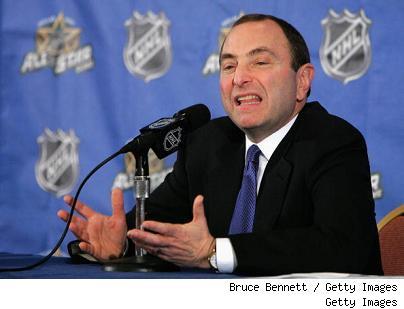The NHL has reportedly submitted an offer to the Player’s Association (NHLPA) for a new collective bargaining agreement for next season that includes several drastic changes.
RDS.ca posted details of the proposal, highlighting changes to many of the issues that the NHL had with the former CBA – changes that show a certain amount of audacity on the NHL’s part.
The NHL-submitted proposal calls for an 11 percent reduction in hockey related revenues for the players from their current 57 percent to 46 percent.
The proposal also puts new sanctions on contracts for all players. Players would need to wait at least 10 years before beco ming unrestricted free agents while contracts would have a five-year limit. Entry level contracts would go from three years to five years, and signing bonuses would be eliminated from the equation as well.
ming unrestricted free agents while contracts would have a five-year limit. Entry level contracts would go from three years to five years, and signing bonuses would be eliminated from the equation as well.
These details of the NHL’s proposal solidify months of rumors regarding some of the issues that the NHL would try to address in the new CBA. Imposing contract limits was expected to be a big issue in the new CBA, especially after lifetime contracts were signed by players like Ilya Kovalchuk, Roberto Luongo, Marion Hossa, and now Jonathan Quick and Sidney Crosby. Plus, a term limit would prevent clubs from tapering off dollar amounts to one or two million per season at the end of a player’s contract in order to keep the cap hit lower.
This could also force star players to move around to more markets that they traditionally might not consider. If a big market team like the Rangers doesn’t have cap space to re-sign their players, but the Nashville Predators have the cap space, a player in the prime of his career may look to jump ship and sign with Nashville instead in order to get what he deserves in the open market. While this could help perpetuate league-wide parity, it could also serve as a catalyst to see more Los Angeles Kings-type playoff runs where any team has a shot to win any given series.
Players, however, may be reluctant to agree to something like this if it means relocating their families every five years, or if it means being away from their families for long periods of time.
Subjecting entry-level players to a longer contract term would also give teams a better chance to build a winner before they have to spend big dollars on their up-and-coming star players. The Edmonton Oilers are a great example of this. The team could potentially have three number-one overall draft selections on their roster next season. The problem is that after next season, Taylor Hall, number one pick in 2010, becomes a restricted free agent and will likely get a significant raise. Similarly, the year after that Ryan Nugent-Hopkins will be in a similar situation with Nail Yakupov following the season after. All of a sudden the Oilers could potentially have a lot of money tied up in just three players with very little money to spend to sign players that would address other needs.
But extending entry level contract terms from three to five years would give a team in a similar situation as the Oilers the chance to put that money elsewhere, say, toward a stud goalie and some defensive depth. It would give them a better chance to put together a winning team before they need to start paying their star players big bucks.
The other major obstacle involves revenue sharing, where the players currently take 57 percent of the pot. The NHL’s offer calls for an 11 percent reduction to 46 percent. While this is a significant and severe call to action, it’s likely more of a negotiating ploy and the two sides will likely meet somewhere in the middle, probably closer to a 50-50 split.
Just because the NHL put this proposal on the table does not mean that these terms as they stand will be included in the new CBA. It’s probably more of a starting point, with the NHL saying ‘these are the issues at hand, this is what we would like to see happen.’ The Player’s Association will return with a counter proposal and they will (hopefully) meet in the middle and hockey will (hopefully) resume next season.
With that being said, it’s up to the players to determine how to react to this proposal. They can view it as a call to negotiate terms for the future, or they can view it as a declaration of war by the NHL, which most certainly could result in a loss of part or all of next season.
If nothing else, the NHL has laid out their big issues regarding the next CBA, and now await a response from the Player’s Association.



this is kind of absurd. i can understand wanting to add to entry level deals, but i dont think you should be able to limit a contract length. maybe put in a provision that the contract cant taper off, that the last year of a deal cant be any less than 50% what the average of the first half of the deal is? also, the NHL signed a new TV deal worth big bucks. the salary cap has doubled since 2006. either keep the cap high, at 70-75 million, and split the revenues 50-50, or lower the cap and give the players more %.
I look at this as a first draft. It’s very unlikely that many of these initiatives will pass as is, and some will likely not pass through at all. That being said, this proposal definitely gives us an idea of the changes the owners want to see to the next CBA.
I agree, I don’t like the idea of term limits to contracts. I like your idea with the 50 percent ratio. I’ve also read that they may change the cap hit from the average of the contract term to what the player actually makes per season. Or state that contracts can only take players to 35 and after that they can only sign one or two-year deals until they retire. Regardless, I don’t think it’s fair to tell a player he can only sign a five year deal, but I think they will work out an agreeable solution for both sides.